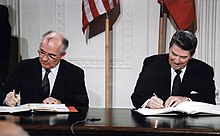Washington Summit (1987)

The Washington summit was the third summit between US President Ronald Reagan and the General Secretary of the Central Committee of the Communist Party of the Soviet Union (CPSU), Mikhail Gorbachev . It took place in Washington, DC between December 8-10, 1987 .
Reagan and Gorbachev discussed regional conflicts in Afghanistan, Central America and southern Africa, arms control issues for chemical and conventional weapons, the status of the START negotiations and human rights. The highlight of the conference was the signing of the INF (Intermediate Nuclear Forces) contract . It obliges the contracting parties to completely dismantle all medium-range nuclear missiles. On the occasion of the summit in Moscow on June 1, 1988, the exchange of the ratification documents took place in the Kremlin. The contract came into force on the same day.
Starting position
After the near breakthrough at the Reykjavik summit last year, and to the chagrin of many supporters of both leaders, Reagan and Gorbachev began allocating more resources to negotiating the INF treaty. In the run-up to the summit, this led to a tense situation in both countries.
For Reagan, the stock market crash on Black Monday , Robert Bork's failure in the Senate for the nomination to the Supreme Court and the Iran-Contra affair created political pressure. In addition, Reagan came under fire from an unusually large number of well-known politicians in his own Republican Party , such as former President Richard Nixon , former Foreign Secretary Henry Kissinger , commentator William Buckley and members of his own government.
Gorbachev also encountered domestic political resistance, not only in the INF treaty negotiations, but also in his perestroika reform programs. After the spectacular landing of Mathias Rust in a Cessna on the Great Moscow River Bridge in Moscow on May 28, 1987 Gorbachev dismissed along with the Minister of Defense Sergei Sokolov and the chief of the Soviet air defense , Alexander Koldunow over 300 more perestroika - and glasnostfeindlich set generals.
Gorbachev's frustration was further heightened when, just two months before the Washington summit, the then member of the Politburo and supporter of Gorbachev, Boris Yeltsin , condemned the Soviet General Secretary and stepped down from his post as Moscow party leader in an unprecedented and highly controversial step.
Summit preparations
Although Gorbachev's position was unusually controversial in Moscow at the end of October, the two foreign ministers George P. Shultz (USA) and Eduard Shevardnadze (USSR) were able to attend to the final details of the INF treaty and the preparations for the summit at a meeting in Moscow.
At the time of the summit, despite external complications, most of the details of the INF treaty had already been worked out. A week before the meeting, the New York Times reported that "on December 8th, the Soviet leader and President Reagan will sign a treaty that will eliminate the two nations' short- and medium-range missiles ..." although the newspaper admitted that that discussions on “reducing far-reaching strategic nuclear weapons” continued to run into obstacles.
Summit course
| Date Time | place | Main topic of discussion | Remarks |
|---|---|---|---|
| December 8, 10: 45-12: 30 |
Oval Office , White House | Human rights, emigration, improving relations between the Soviet Union and the United States, arms control | |
| December 8, 2: 30-15: 15 |
Cabinet conference room , White House | Arms control for conventional and chemical weapons | |
| December 9, 10: 35-10: 45 |
Small office next to the Oval Office | The President and General Secretary sign a baseball for Joe DiMaggio . | Informal meeting between the two leaders. |
| December 9, 10: 55-12: 35 |
Oval Office | Progress of the START discussions on the Strategic Defense Initiative (SDI) , Anti-Ballistic Missile Treaty (ABM) , Afghanistan, the Iran-Iraq War . | |
| December 10, 12: 00-12: 15 |
Oval Office | Various regional themes | |
| December 10, 12: 40-14: 10 |
Family dining room, White House | In a joint declaration, it was discussed how progress on regional issues (withdrawal of Vietnam from Cambodia, Afghanistan, Latin America, Africa) can be characterized, Indochina Conference , North Korea | This meeting was a working lunch that started right after the last meeting. This meeting ended largely with self-adoring statements and an exchange of jokes. |
literature
- “ The INF Treaty and the Washington Summit: 20 Years Later ”. National Security Archive Electronic Briefing Book No. 238 . Edited by Sventlana Savranskaya and Thomas Blanton. The National Security Archive (George Washington University). 2007.
- Hayward, Steven F. (2010). The Age of Reagan: The Conservative Counterrevolution 1980-1989 . New York: Three Rivers Press. ISBN 978-1-4000-5358-2
- Herring, George C. (2008). From Colony to Superpower: US Foreign Relations Since 1776 . New York: Oxford University Press. ISBN 978-0-19-507822-0
- Keller, Bill. " Politics and Security Concerns Dash Hopes for Extended Trip by Gorbachev ". New York Times (October 31, 1987).
- Shipler, David K. “ Gorbachev Mix On TV Is Tough But Cooperative ”. New York Times (December 1, 1987).
Individual evidence
- ↑ Thomas Stamm-Kuhlmann : Missile Armament and International Security from 1942 to the Present. Historical communications / supplement, vol. 56, Steiner, Stuttgart 2004, p. 124.
- ↑ Federal Agency for Civic Education: December 8, 1987
- ↑ Stefan Locke: The long odyssey of the dove of peace. In: Frankfurter Allgemeine Zeitung , May 12, 2012.
- ↑ Disarmament: "Now history is being made" . In: Spiegel online from September 21, 1987

